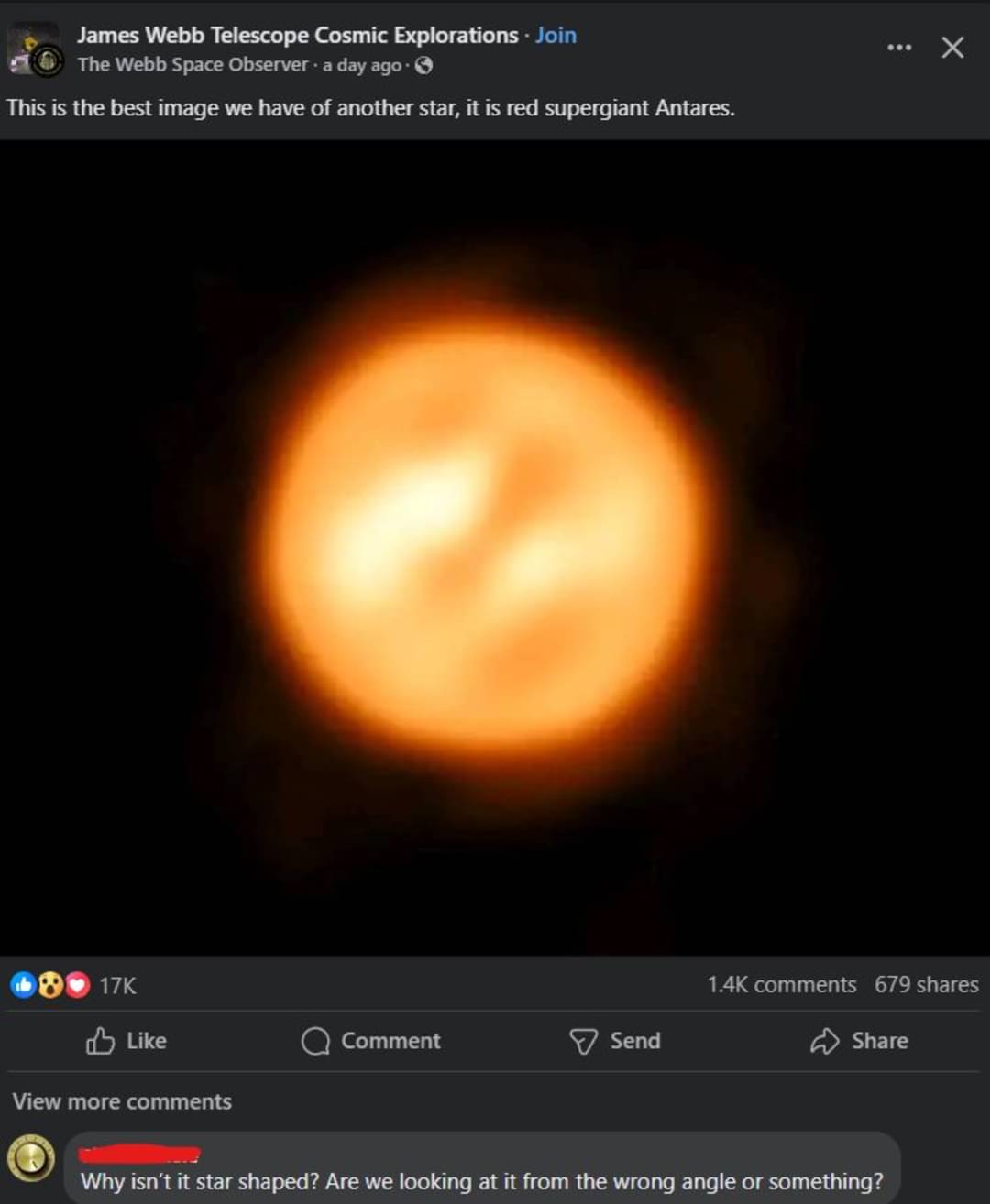Not really a bad question. The diffraction spikes have been corrected for.
Science Memes
Welcome to c/science_memes @ Mander.xyz!
A place for majestic STEMLORD peacocking, as well as memes about the realities of working in a lab.

Rules
- Don't throw mud. Behave like an intellectual and remember the human.
- Keep it rooted (on topic).
- No spam.
- Infographics welcome, get schooled.
This is a science community. We use the Dawkins definition of meme.
Research Committee
Other Mander Communities
Science and Research
Biology and Life Sciences
- [email protected]
- [email protected]
- [email protected]
- [email protected]
- [email protected]
- [email protected]
- [email protected]
- [email protected]
- [email protected]
- [email protected]
- [email protected]
- [email protected]
- [email protected]
- [email protected]
- [email protected]
- [email protected]
- [email protected]
- [email protected]
- [email protected]
- [email protected]
- [email protected]
- [email protected]
- [email protected]
- [email protected]
- !reptiles and [email protected]
Physical Sciences
- [email protected]
- [email protected]
- [email protected]
- [email protected]
- [email protected]
- [email protected]
- [email protected]
- [email protected]
- [email protected]
Humanities and Social Sciences
Practical and Applied Sciences
- !exercise-and [email protected]
- [email protected]
- !self [email protected]
- [email protected]
- [email protected]
- [email protected]
Memes
Miscellaneous
Honest question: Do people think stars look like the star shape because of diffraction spikes in refractor telescopes? I thought the star shape pre-dated any refractor telescope. And I don't know how many people would have seen refractor images back in the days to make it so culturally engrained?
The post-processing used in astronomical observations is a really interesting topic. I'm following the debate around the black hole images with great interest. I don't know enough about the specifics to have an opinion, but it is very interesting and has overlap with some of the things I do for work.
I’ve always wondered this. For now I’ve settled on the hypothesis that all the first astronomers all had astigmatism.
People have indeed thought this before telescopes. You'll most likely see diffraction patterns around bright lights because of eyelashes and other imperfections, probably different for each eye but the same for all lights (technically, wavelength also matters but not really on this scale).
Thought that is how they look like or represented them as such in art?
My understanding was that most understood them as light sources, very similar to how we do, but rather then cosmic body they saw angels or whatever fits their religious framework.
Its not like people where unaccustomed to the night sky, but maybe deeper psychological interpretation plays a role.
Stars can seem spikey to the naked eye
They look star-shaped because of refraction on the atmosphere and in our eyes. Those telescopes just have way larger relative distortions because they do have larger distortions and can see smaller things.
there are a series of things that can make points of light look spiky: eye defects, eyelashes when squinting, smudgy glasses, etc..
It's having a bad hair day, give it a rest!
It's always day if you're a star. Or night?
Yes, that's the problem
Have you looked at its other side?
I imagine if I were near Antares and looked the other way, it would very much look like night.
The floor is night!
But that too.
I like the corona though.
Why star, if not star shaped?
Well of course, because it's spinning too fast. So you don't see the star shape, only the blurry circle!
A smart and wise person uses this opportunity to teach. A smug asshole uses this opportunity to scoff.
an even smarter and wiser person uses this opportunity to make a post on c/science_memes
Goodness gracious, great balls of fire!
From what angle would you look at the traditional star shape and see a circle?
What did I read? Oh boy...
Looks like it's holding a big baby. Awwww!
